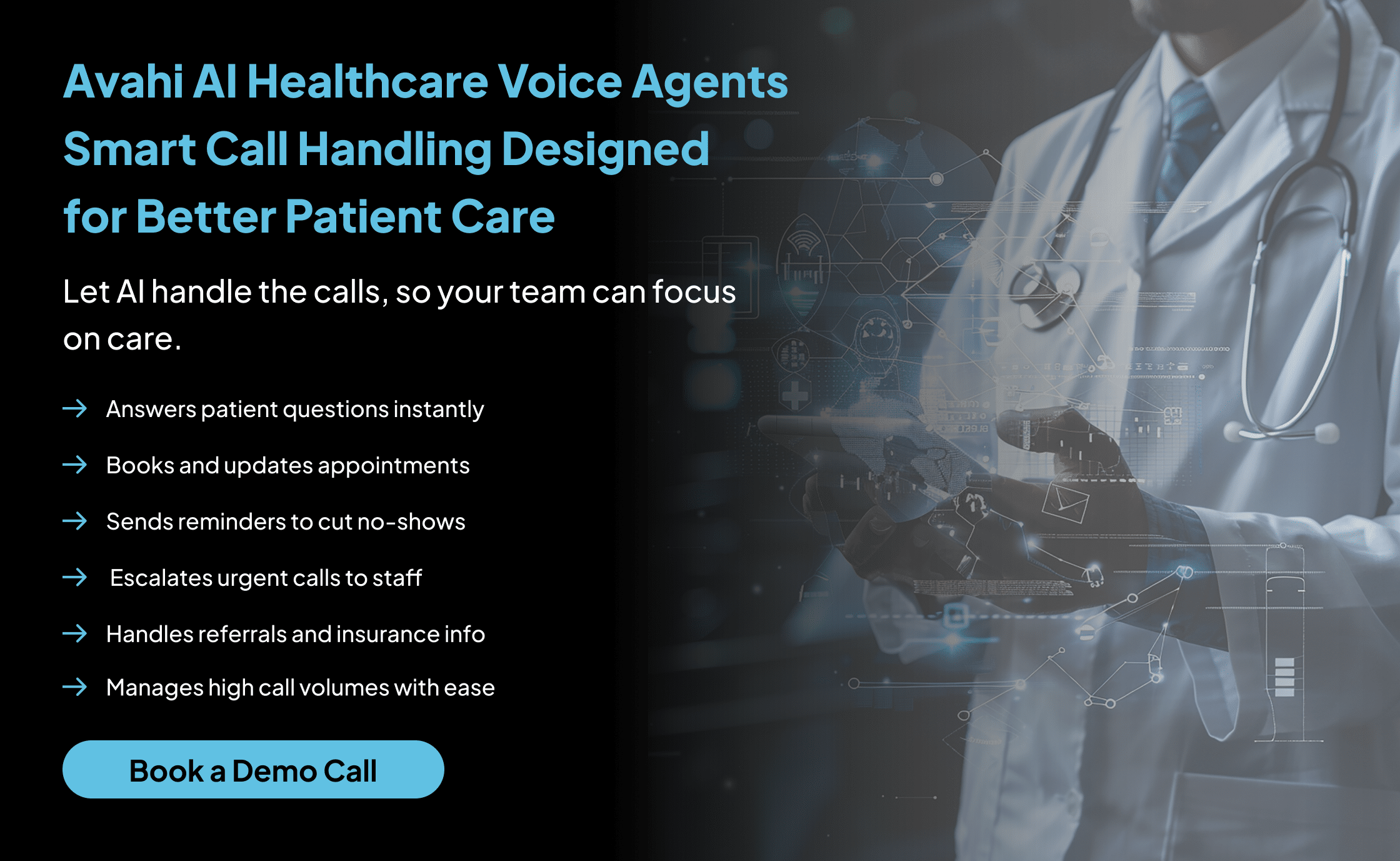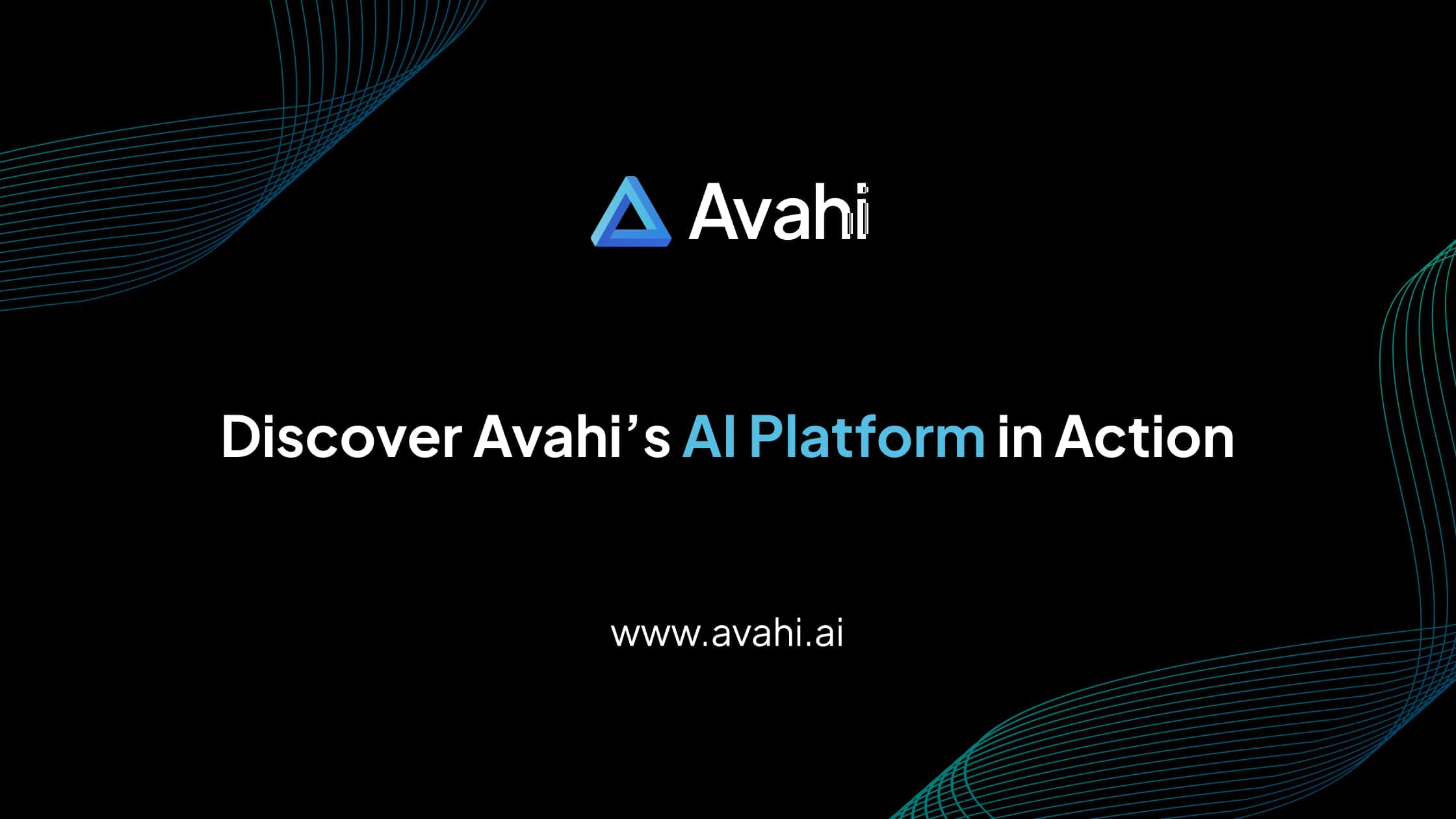TL;DR
|
In 2024, the global market for AI voice agents in healthcare reached $468 million, with projections estimating a 37.8% compound annual growth rate (CAGR) through 2030.
At the same time, hospitals face rising patient volumes, increasing clinician burnout, and growing administrative pressure. In the U.S. alone, healthcare providers spend nearly half their day on documentation and desk work, reducing direct patient interaction and contributing to workforce fatigue.
AI voice agents are emerging as a direct solution to this problem. These systems are already being used to automate call centers, generate real-time clinical notes, and triage patients faster, without compromising accuracy or compliance. From reducing call volumes by up to 70% to cutting documentation time, their impact is measurable and growing.
This blog explores the technologies driving this shift, real-world use cases, operational gains, and implementation strategies, giving healthcare leaders a clear, practical view of what’s possible and how to adopt it effectively. Whether you’re a healthcare executive, digital health strategist, or clinical operations lead, this blog offers a comprehensive view of how to evaluate and implement AI voice agents in healthcare effectively.
Understanding the Core Issues in Modern Healthcare
Healthcare systems around the world face mounting pressure to deliver high-quality patient care while managing operational inefficiencies. AI voice agents are emerging as a practical tool to address several persistent challenges in this environment. Below are three of the most critical pain points these technologies aim to solve:
1. Administrative Burden & Long Wait Times
Hospitals and clinics receive hundreds to thousands of calls daily for appointment bookings, cancellations, prescription refills, and test results.
Regular call centers are often understaffed, leading to long hold times, frustrated patients, and overloaded administrative staff. In many cases, patients hang up or miss their appointments due to delayed responses, leading to lower care efficiency and wasted time slots.
2. Documentation Fatigue & Clinician Burnout
Physicians spend a large portion of their working hours documenting patient interactions, updating medical records, and entering data into electronic health systems.
This leads to more extended workdays, reduced face-to-face time with patients, and increasing rates of burnout. Many clinicians report that paperwork takes away from their ability to deliver personalized care.
3. Accessibility & 24/7 Support Needs
Many patients require assistance outside regular office hours, especially those managing chronic conditions, disabilities, or mobility issues.
Regular systems are limited by working hours and staff availability, making it hard for patients to get timely responses or book care when they need it. This is particularly difficult for elderly or visually impaired individuals who may struggle with complex web portals or mobile apps.
The Technology Behind AI Voice Agents in Healthcare
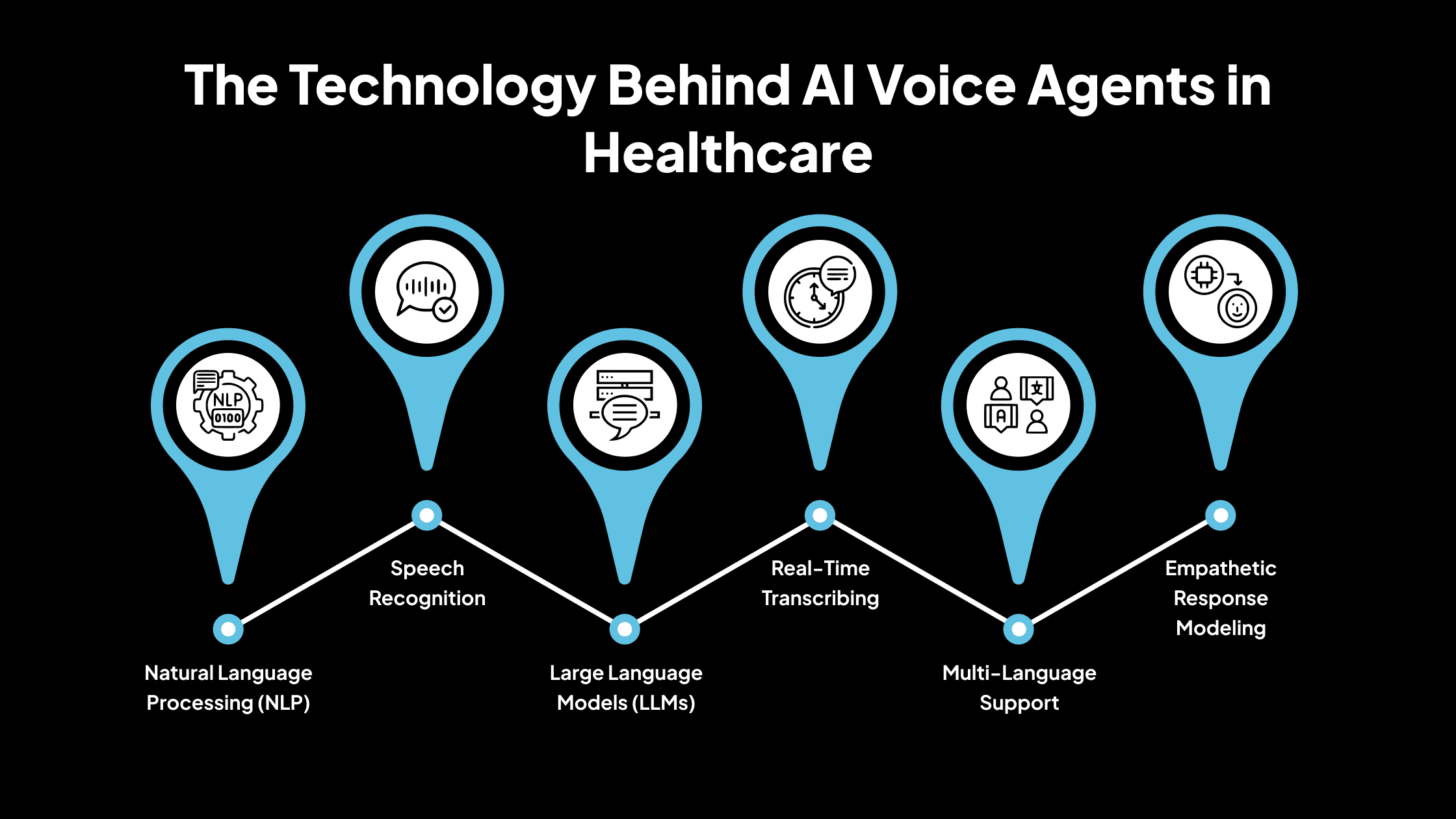
AI voice agents in healthcare rely on several foundational technologies to understand, process, and respond to patient and provider inputs. Each component plays a specific role in ensuring the system is accurate, usable, and compliant.
1. Natural Language Processing (NLP)
NLP allows AI systems to understand and interpret human language. In a healthcare setting, this involves parsing spoken or written input that includes medical terminology, patient symptoms, or appointment requests. NLP helps extract intent and relevant information from such conversations.
For example, if a patient says, “I’d like to schedule a follow-up for next week,” NLP helps identify the intent (scheduling) and the timeframe (next week).
2. Speech Recognition
Speech recognition systems convert spoken language into text. In healthcare, they are essential for real-time documentation or for interacting with patients over phone systems. The challenge lies in accurately recognizing medical vocabulary, various accents, and speech variations under different acoustic conditions.
There are specific AI solutions designed to operate in noisy environments like clinics or call centers while recognizing specialized terminology. This ensures the voice agent can reliably capture information without requiring human intervention.
3. Large Language Models (LLMs)
LLMs support complex text interpretation, reasoning, and response generation. In AI voice agents, LLMs are used to create coherent and contextually appropriate responses during patient interactions.
They can summarize clinical conversations or provide general information in natural language. This is particularly helpful for creating post-visit summaries or patient education materials. Healthcare-specific LLMs are often fine-tuned using clinical datasets to reduce the risk of incorrect or irrelevant responses.
4. Real-Time Transcribing
Real-time transcription involves instantly converting speech to text during a conversation. This is used in clinical settings to support documentation or follow-up processes. Real-time transcription must be both fast and accurate to avoid disrupting workflows. This is especially important during patient consultations, where details must be captured precisely.
5. Multi-Language Support
Healthcare systems serve diverse populations. Voice agents must recognize and respond in multiple languages to ensure accessibility and inclusivity. Multi-language support includes speech recognition, NLP, and response generation in various languages.
For example, a Spanish-speaking patient should be able to schedule an appointment or receive instructions in their native language. This functionality enhances patient experience and reduces communication errors.
6. Empathetic Response Modeling
Empathetic response modeling involves generating responses that are not just factually correct but also appropriate in tone and context. In healthcare, conversations frequently involve sensitive or emotionally charged topics. The AI must avoid sounding robotic or dismissive.
Systems use structured response libraries or tone-modulating algorithms to maintain a neutral but understanding tone. This ensures that patients feel heard and supported while maintaining clinical professionalism.
The Role of Compliance in Deploying AI Voice Agents in Healthcare
Voice agents in healthcare must comply with strict data security and regulatory requirements. These considerations ensure patient data remains confidential and that systems function safely within clinical environments.
1. HIPAA Compliance
The Health Insurance Portability and Accountability Act (HIPAA) requires secure handling of patient health information. AI voice agents must encrypt data during transmission and storage, maintain audit trails, and ensure only authorized users can access sensitive information. HIPAA compliance is mandatory for all systems handling protected health information in the U.S.
2. Data Governance
Proper data governance encompasses rules governing the collection, storage, sharing, and deletion of data. Healthcare organizations must maintain control over patient data processed by voice agents. This includes setting retention policies, ensuring transparency about data usage, and avoiding data misuse.
3. On-Premise vs. Cloud Deployment
Some healthcare providers prefer on-premise deployment for tighter control over patient data, while others use secure cloud environments for scalability.
The choice depends on organizational policies, infrastructure, and compliance needs. Providers must assess risks and ensure the chosen setup meets both technical and legal standards.
4. Emergency Escalation and Human Fallback
AI voice agents cannot handle every situation, especially emergencies or ambiguous inputs. Systems must include escalation protocols that immediately transfer calls or tasks to a human operator.
For example, if a patient expresses symptoms of a heart attack or confusion about instructions, the system must stop and alert staff.
Practical Applications of AI Voice Agents in Patient Care
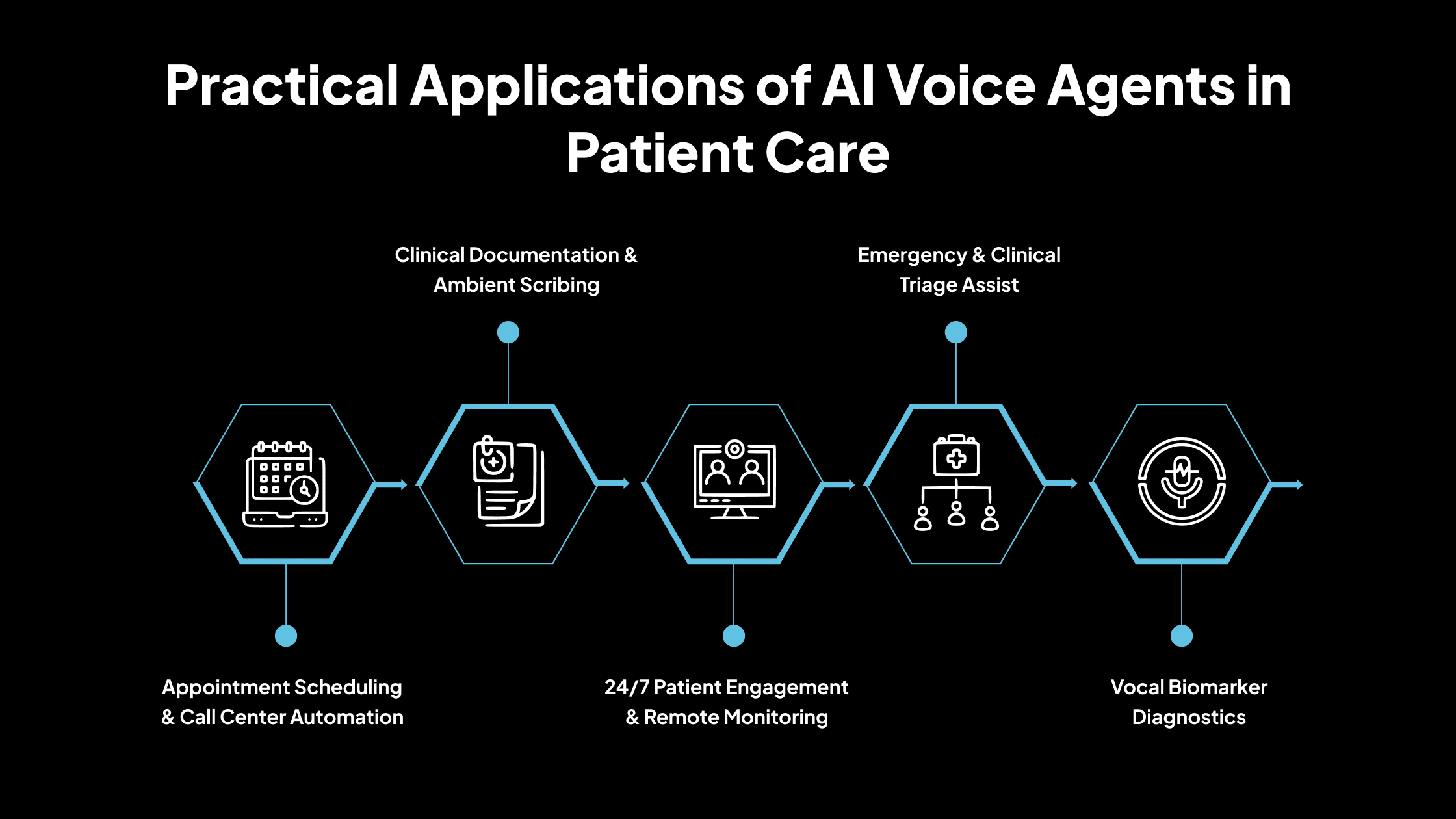
Here are the core areas where AI voice agents are currently being deployed to enhance different functions within healthcare organizations.
1. Appointment Scheduling & Call Center Automation
Healthcare providers frequently encounter high volumes of inbound calls regarding appointment scheduling, prescription refills, and referral coordination. AI voice agents are now automating these routine call center interactions, which reduces the load on front-desk staff and improves responsiveness. These systems operate 24/7, help decrease patient wait times, and have been associated with patient satisfaction levels exceeding 90% in some deployments.
2. Clinical Documentation & Ambient Scribing
Clinical documentation is a time-consuming process for physicians. On average, providers spend 1.5 to 2 hours daily on note-taking and charting. AI voice agents with ambient scribing capabilities transcribe and summarize patient visits in real time, significantly reducing this burden.
Studies reported by The Wall Street Journal indicate that AI-driven scribing can reduce documentation time from approximately 90 minutes to under 30 minutes per day. AI solutions like Avahi integrate directly into electronic health record (EHR) systems and meet compliance standards, including HIPAA, GDPR, and NHS guidelines.
3. 24/7 Patient Engagement & Remote Monitoring
Many patients require access to information or support outside of standard clinic hours. AI voice agents serve as always-available virtual assistants, helping patients with inquiries, appointment confirmations, medication reminders, and post-discharge follow-up.
These systems enable continuous patient interaction, improving adherence to care protocols. A recent study highlights their value in underserved regions, where these agents help support chronic disease management and preventive health monitoring. These tools enable early intervention by collecting health data and alerting care teams when necessary.
4. Emergency & Clinical Triage Assist
In situations where immediate assessment is needed, such as identifying stroke symptoms or acute distress, AI voice systems can provide structured triage support. Some systems are designed to guide non-medical users through step-by-step evaluations using voice-based prompts.
Research published in JMIR and ScienceDirect outlines how these tools can support emergency decision-making in remote or resource-constrained settings. While not a substitute for medical professionals, these systems provide an initial layer of support that can prompt urgent care or escalate to human operators.
5. Vocal Biomarker Diagnostics
Recent studies have shown that vocal features can serve as indicators of certain health conditions. AI systems are being trained to detect patterns in voice that may signal underlying issues, such as metabolic disorders or respiratory conditions.
A notable example involves the detection of Type 2 diabetes using short voice recordings, which, when combined with basic health data, achieved an accuracy of approximately 89% for women and 86% for men. This application of vocal biomarker analysis is still in early stages but shows promise for non-invasive, cost-effective screening in primary care or remote monitoring contexts.
Industry Use Cases: Where AI Voice Agents in Healthcare Are Making an Impact
The following examples demonstrate how organizations are leveraging these solutions to enhance documentation, minimize operational delays, and improve clinical outcomes.
1. Ambience Healthcare
Ambience Healthcare has secured $243 million in funding to expand its suite of tools focused on ambient transcription and administrative automation. The company develops AI systems that transcribe clinical conversations in real time and automate the creation of patient notes, referrals, and summaries.
Ambience is currently utilized by major health systems, including the Cleveland Clinic, to reduce the manual workload of clinicians and streamline administrative documentation. These systems help physicians refocus their attention on patient care while ensuring compliance with clinical standards.
2. Microsoft Dragon Copilot
Developed using Nuance’s speech recognition and healthcare AI capabilities, Microsoft’s Dragon Copilot acts as a real-time voice assistant. It helps clinicians automate note-taking, summarize patient visits, and initiate tasks like referrals or medication orders through voice commands.
The tool supports multilingual dictation, integrates with major electronic health record (EHR) systems, and is designed to comply with healthcare privacy regulations, including HIPAA and GDPR. Dragon Copilot helps reduce the administrative burden while enabling more accurate clinical documentation.
3. NexusMD
NexusMD, based in Australia, raised $6.3 million to develop AI-driven agents tailored for clinical environments, with a focus on emergency departments and acute care.
By automating medical documentation and compliance tasks, NexusMD has reportedly improved emergency department (ED) performance by 30%, including reductions in admission delays and faster documentation workflows. These outcomes are tied to enhanced data accuracy and better regulatory alignment in high-pressure care environments.
4. NHS AI Discharge Pilot
The UK’s National Health Service (NHS) is testing an AI tool that automatically generates hospital discharge documents, which are critical for patient transfer and ongoing care coordination.
The tool is created to reduce administrative delays, free up hospital beds, and enable clinicians to focus on direct patient care rather than paperwork. This pilot is part of a broader initiative to modernize healthcare operations using AI while maintaining documentation standards.
Essential Considerations for Rolling Out AI Voice Agents Effectively
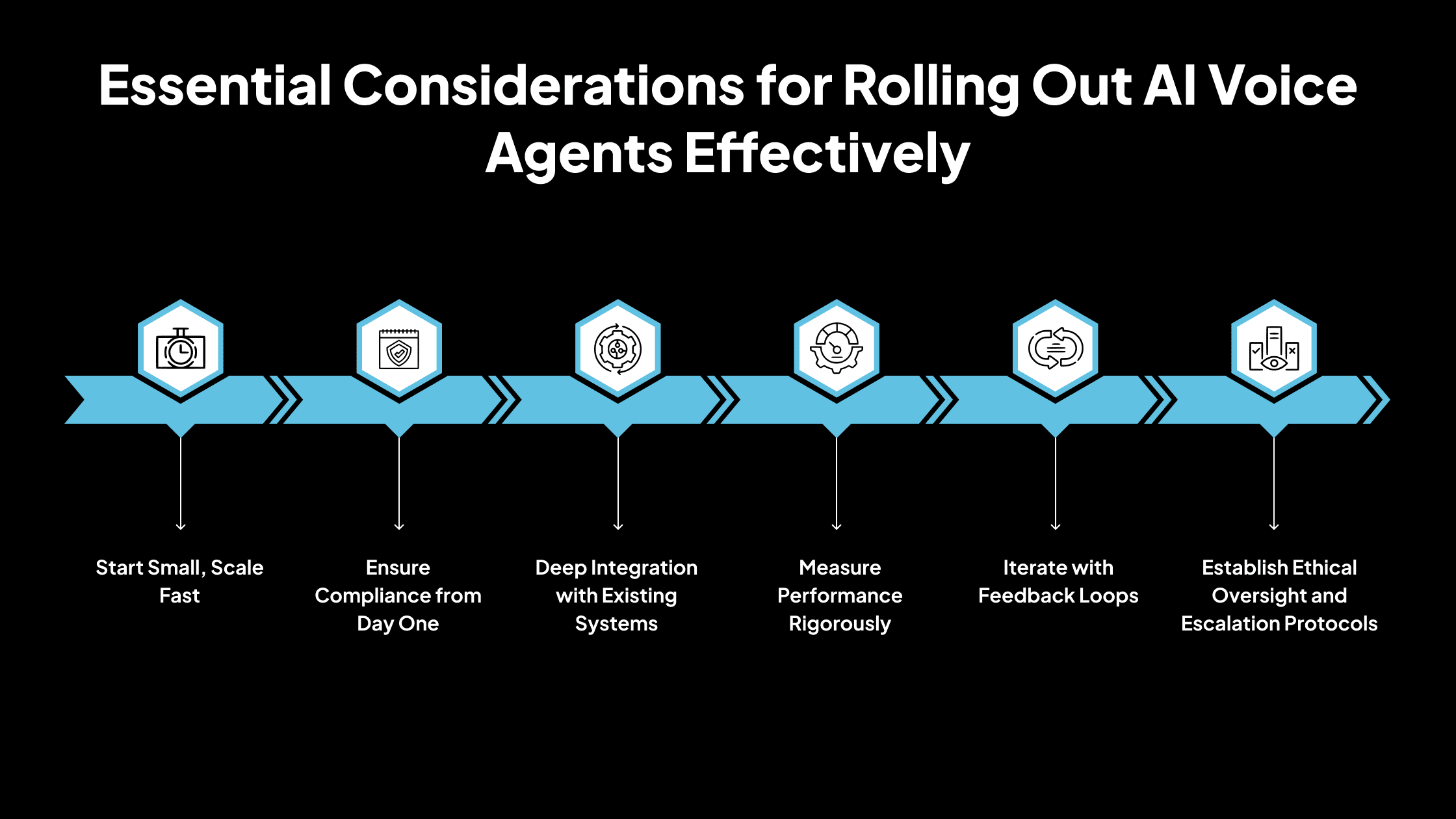
Successfully deploying AI voice agents in healthcare requires a structured approach. The following best practices help ensure reliable performance, patient safety, and long-term scalability.
1. Start Small, Scale Fast
Begin implementation with a focused pilot in a high-impact area such as appointment scheduling or prescription refills. These workflows are routine, well-defined, and often have high volumes, making them ideal for testing functionality and reliability. Once proven effective, the solution can be expanded to other departments or use cases.
2. Ensure Compliance from Day One
Any AI solution used in healthcare must adhere to data security and privacy regulations from the outset. This includes frameworks like HIPAA, SOC 2, and PCI DSS. Ensuring compliance at the implementation stage prevents legal risk, protects patient information, and supports trust from clinicians and administrators.
3. Deep Integration with Existing Systems
For AI voice agents to be effective, they must integrate directly with existing hospital systems, including electronic health records (EHRs), customer relationship management (CRM) tools, and phone systems. Integration enables seamless information flow, avoids duplicate entries, and reduces the need for manual handoffs.
4. Measure Performance Rigorously
Track performance metrics such as call deflection rates, average hold times, customer satisfaction scores (CSAT), and error rates. These indicators provide a clear view of system effectiveness and help identify areas for improvement. Regular monitoring ensures the solution remains aligned with operational goals.
5. Iterate with Feedback Loops
Use call recordings, post-call summaries, and sentiment analysis dashboards to refine the AI’s responses and behavior. This continuous feedback loop allows the system to improve over time, adapt to new scenarios, and reduce recurring issues. User feedback, both from patients and staff, should inform future updates.
6. Establish Ethical Oversight and Escalation Protocols
Define clear rules for when and how the AI should escalate a task to a human operator. This includes handling emergencies, unrecognized inputs, or sensitive conversations. Escalation protocols must be well-documented and regularly tested to ensure safe transitions and maintain high-quality care.
Avahi AI Healthcare Voice Agents: Turning Calls into Patient Care
Managing patient calls is one of the most resource-intensive tasks for healthcare providers. Missed calls often result in missed appointments, lower patient satisfaction, and increased staff stress. Avahi AI Healthcare Voice Agents are designed to address this challenge by handling routine calls, scheduling, and follow-ups, allowing clinical teams to focus on what matters most: patient care.
These AI voice agents are built for healthcare practices, clinics, and hospitals that need reliable support in managing call volumes. They are particularly valuable for high-demand environments such as dental practices, specialty care, behavioral health, primary care, and urgent care, where patient communication is frequent and time-sensitive.
What the Agents Handle
Avahi’s AI system is trained to manage everyday patient interactions, including:
- Answering routine questions and scheduling requests.
- Book, reschedule, and cancel appointments in real-time.
- Sending reminders and follow-ups to reduce no-shows.
- Routing urgent issues directly to staff for immediate attention.
- Handling insurance queries, referrals, and call triage.
This capability reduces wait times for patients, ensures that urgent calls are prioritized, and helps clinics maintain a steady flow of booked appointments.
How it works
Integrate with Your Phone System
Seamlessly connects to your existing call platform, handling live and missed calls with office-specific configurations.
Configure High-Volume Requests
Addresses essential call drivers, scheduling, refills, directions, insurance, and referrals, with automatic escalation when required.
Fast Deployment
Complete setup and onboarding within days, supported by real-time monitoring and ongoing assistance.
Avahi is deployed on AWS’s healthcare-ready cloud infrastructure. It is HIPAA-ready, SOC 2, and GDPR compliant, ensuring patient data is processed securely and responsibly. The system scales easily across practices of all sizes and adapts to existing scheduling systems and EHRs.
Discover Avahi’s AI Platform in Action
At Avahi, we empower businesses to deploy advanced Generative AI that streamlines operations, enhances decision-making, and accelerates innovation—all with zero complexity.
As your trusted AWS Cloud Consulting Partner, we empower organizations to harness AI’s full potential while ensuring security, scalability, and compliance with industry-leading cloud solutions.
Our AI Solutions Include
- AI Adoption & Integration – Leverage Amazon Bedrock and GenAI to Enhance Automation and Decision-Making.
- Custom AI Development – Build intelligent applications tailored to your business needs.
- AI Model Optimization – Seamlessly switch between AI models with automated cost, accuracy, and performance comparisons.
- AI Automation – Automate repetitive tasks and free up time for strategic growth.
- Advanced Security & AI Governance – Ensure compliance, fraud detection, and secure model deployment.
Want to unlock the power of AI with enterprise-grade security and efficiency?Start Your AI Transformation with Avahi Today!
Frequently Asked Questions
1. What are AI voice agents in healthcare?
AI voice agents in healthcare are automated systems that use artificial intelligence to interact with patients via voice. They can schedule appointments, handle prescription refills, answer routine questions, and triage urgent issues, all through natural conversation, without requiring human staff.
2. How do AI voice agents reduce workload for healthcare staff?
AI voice agents reduce administrative burden by automating high-volume, repetitive tasks such as answering calls, managing scheduling, and sending reminders. This frees up time for healthcare staff to focus on patient care and complex interactions.
3. Are AI voice agents HIPAA-compliant?
Yes. Leading solutions are built with full HIPAA, SOC 2, and GDPR compliance. They include features like data encryption, audit logging, and access controls to ensure patient data is handled securely.
4. How fast can AI voice agents be deployed in a clinic or hospital?
Many solutions can be deployed in less than a week, with minimal disruption. Providers typically go live after phone system integration, configuration of workflows, and brief staff onboarding.
5. Do AI voice agents work with electronic health records (EHR)?
Most modern AI voice agents integrate with popular EHR systems to automate appointment bookings, documentation, and follow-ups. This ensures seamless workflows without manual data entry.

